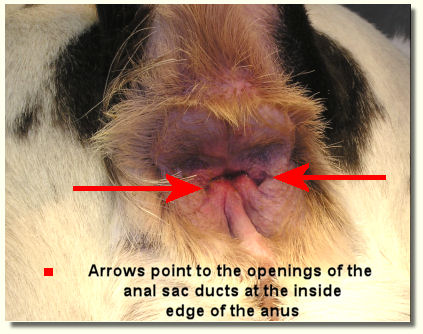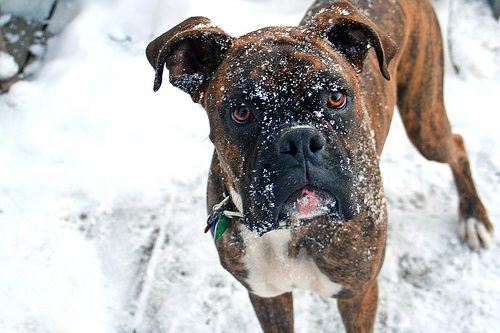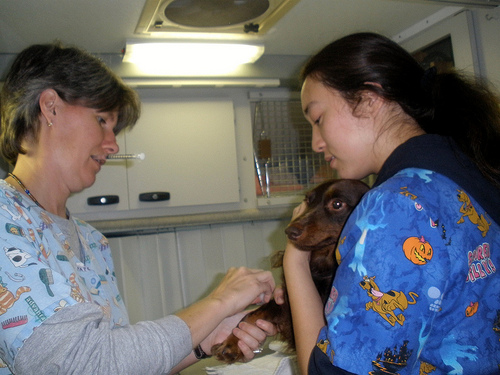
Exocrine pancreatic insufficiency (EPI), also known as maldigestion syndrome, causes an animal to be unable to break down the nutrients in food. This in turn causes the nutrients in the food to pass through the body undigested. Basically, a cat or dog with EPI is starving to death, even as it develops a voracious appetite.
EPI is due to a defect in the pancreas which prohibits the organ's ability to produce the necessary digestive enzymes. The pancreas, though small, produces and stores the enzymes necessary for breaking down protein, starch, and fats in the food the animal eats. If the food is not broken down so that the body can absorb the nutrients, the animal cannot survive. Your pet will also have foul-smelling, loose, light-colored stools and become emaciated quickly.
If your pet is diagnosed with EPI, he or she will require supplementation with digestive enzymes for the rest of their lives. They may also have special dietary needs from time to time. Animals diagnosed with EPI need to be fed small, frequent meals daily (two to three times a day at first), which contain a powdered digestive enzyme replacement. Replacements are also available in pill form that can be given about a half-hour before a meal.
The meal itself should be highly digestible and contain high-quality protein and carbohydrates, while being moderate in fat and lower in fiber. This is because fiber can interfere with the function of pancreatic enzymes. Your veterinarian can help you choose the best possible diet, but some trial and error may be necessary as you determine what works best for your pet. In certain cases, the affected animal may benefit from added vitamins and nutrients.
Some dogs, and the majority of cats, with EPI will also have a deficiency in vitamin B12 (cobalamin). Animals are known to commonly develop a condition called small intestinal bacterial overgrowth (SIBO) along with EPI, which will further reduce vitamin B12 absorption in the gut. This causes them (cats, in particular) to also become deficient in folate (another B vitamin). Other vitamins that may become deficient in certain animals include zinc and the vitamins A, D, E, and K (fat-soluble vitamins). Cats that develop a condition where the blood doesn’t clot normally (coagulopathy) will need supplemental vitamin K.
Vitamin B12 must be given via an injection. This may be required as often as every few weeks to keep your pet at normal levels. Dogs and cats with folate deficiencies may be given oral supplements daily as needed. Your veterinarian will periodically test your pet’s blood for levels of these important vitamins to determine which ones will be needed during the course of your pet’s life.
Fat is a necessary component to any balanced diet. This is even more true if your pet has EPI, as they need some dietary fat to maintain a healthy haircoat and help them absorb certain vitamins. Because most animals with EPI are fed a relatively low-fat diet, the addition of certain fatty acids and special fat sources called medium chain triglycerides (MCTs) may be beneficial.
These MCTs are more readily absorbed by animals with EPI and can be used in the body more efficiently. Coconut oil (unrefined) is one source of MCTs and your veterinarian may recommend supplementation of this and/or another source of omega-3 fatty acids (fish oils) in your pet’s diet.
If your pet has exocrine pancreatic insufficiency, feeding him or her can be tricky. You and your family need to be vigilant about what is given to your pet. Treats, for instance, cannot be given until well after your pet’s condition is stable, and even then must be carefully chosen. Dietary changes must be handled slowly and your veterinarian should be consulted when considering an addition or alteration to the daily diet.
EPI can be managed, but it will require you to be watchful.
 Remedies for Arthritis in Dogs: Glucosamine, Chondroitin Sulfate, Steroids, and NSAIDs
By T.J. Dunn, Jr., DVM
Glucosamine and Chon
Remedies for Arthritis in Dogs: Glucosamine, Chondroitin Sulfate, Steroids, and NSAIDs
By T.J. Dunn, Jr., DVM
Glucosamine and Chon
 Anal Sacs Problems in Dogs (and Cats)
By T. J. Dunn, Jr., DVM
Few topics raise dog owner
Anal Sacs Problems in Dogs (and Cats)
By T. J. Dunn, Jr., DVM
Few topics raise dog owner
 8 Tips For Caring For Your Pet This Winter
Living in a Winter Wonderland?
Unless you&
8 Tips For Caring For Your Pet This Winter
Living in a Winter Wonderland?
Unless you&
 Veterinary Specialists: Who Are They, Really
By T. J. Dunn, Jr., DVM
Tuesday, September
Veterinary Specialists: Who Are They, Really
By T. J. Dunn, Jr., DVM
Tuesday, September
 Therapeutic Services for Dogs (and Cats)
You know there are physical therapy center
Therapeutic Services for Dogs (and Cats)
You know there are physical therapy center
Copyright © 2005-2016 Pet Information All Rights Reserved
Contact us: www162date@outlook.com